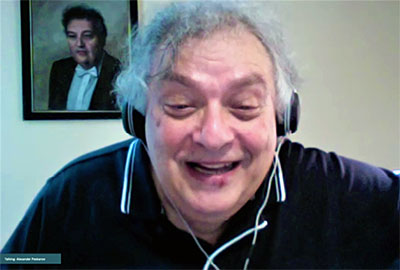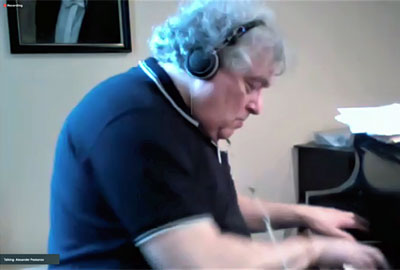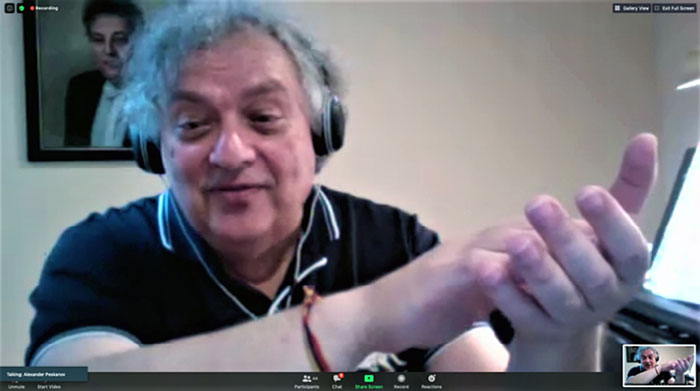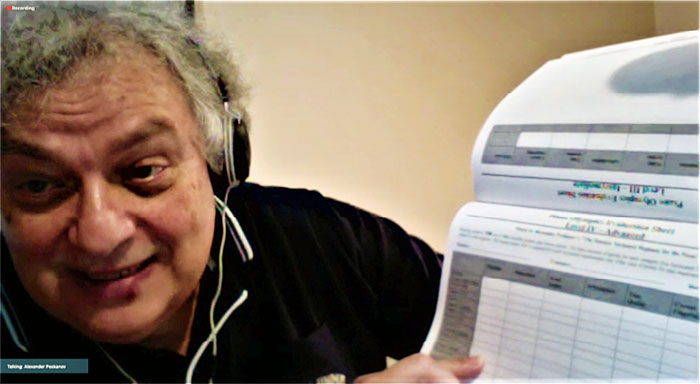Music Educators Association of New Jersey
Serving teachers and students since 1927


 In the very first MEA online General Meeting, (via Zoom), 45 members enjoyed an inspiring lecture and performance by Alexander Peskanov, prize-winning pianist, composer, author, consultant, teacher, and lecturer. The show, albeit remote, must go on! And it did! For more information about Mr. Peskanov, please visit https://peskanov.com.
In the very first MEA online General Meeting, (via Zoom), 45 members enjoyed an inspiring lecture and performance by Alexander Peskanov, prize-winning pianist, composer, author, consultant, teacher, and lecturer. The show, albeit remote, must go on! And it did! For more information about Mr. Peskanov, please visit https://peskanov.com.
As members were admitted from the virtual waiting room, Alexander Peskanov warmed up at the piano, giving us a preview of his regimen of wonderful-sounding solid and broken chords in classic patterns. The Zoom administrator, Marjie Terry, daughter-in-law of MEA President Yudit Terry, spoke briefly before Yudit began the meeting with the election of officers. She then introduced Alexander Peskanov.
 After hearing the keyboard warm-ups, we were treated to Clouds, an exquisite Peskanov composition, with drifting melodies and gently moving accompaniment. He poetically recalled what it was like as a child to gaze out of a window of a dreadful Ukrainian apartment that had a magnificent view of the Black Sea.
After hearing the keyboard warm-ups, we were treated to Clouds, an exquisite Peskanov composition, with drifting melodies and gently moving accompaniment. He poetically recalled what it was like as a child to gaze out of a window of a dreadful Ukrainian apartment that had a magnificent view of the Black Sea.
The purpose of giving lessons, our speaker said, was to teach students how to practice. “Self evaluation is the key.” You can accomplish this goal teaching online. He began online teaching 15 years ago to conveniently maintain contact with colleagues and hear students while on tour. “It was fun, so I decided to take it seriously.” The equipment Mr. Peskanov was using included a separate camera, an external microphone on a Boom stand, and earphones “that help me focus. Every detail is audible. Angle the camera for a view of hands and keyboard.”
You can record a lesson on a split screen with Skype, then give the student a complete recording. You can build a recording library of demonstrations.” Mr. Peskanov continues to work as a teacher and consultant for people worldwide.
Throughout the talk, Mr. Peskanov would repeat the wise words of his first teacher, Rosalia Leontievna Molodietzkaya, a pupil of a pupil of Theodor Leschetivsky. Rosalia was his neighbor. She expected him to visit her daily for lessons. She always asked, “Are you comfortable?” Playing without straining was her goal. Alexander studied with her for the last four and a half years of her life. She advised, “Become your own teacher; self evaluation is essential while you practice. Be critical: stop and pay attention. Practice is not measured in minutes, but in the process of listening, evaluating, and revising.” And she always asked, “Are you comfortable?” Years later, Mr. Peskanov appreciated the value of this question as the key to having control. Discomfort and tightness lead to distraction.

He mentioned that adjusting body position and movement, (for example, sitting at the best distance from the keys, moving from left to right as in the opening bars of the Tschaikowsky Piano Concerto No. 1, and playing with relaxed rather than tensely raised shoulders) improves control and sound quality.
Observation at an online lesson can remedy discomfort. Technique concerns more than fingers; it involves the mind. Observe where the student looks: is it at the music or the hands? How is his reading, and how does he memorize? Has he practiced hands separately?
Alexander Peskanov believes that the ability to play with comfort while producing good tone quality can be learned through the Russian system of converting weight into sound. A scale is first played dropping the wrist on every note, using the arm weight. Count thusly: drop on counts 1,2 and raise wrist slowly on 3,4. And ask, “Are you comfortable?” “The wrist is the breathing mechanism of the hand,” he said. In playing a pentascale, the wrist moves laterally. In playing arpeggios, “flying fingers” play by swiftly shifting hand position. The arms do not flap at the elbows. There is no stretching, twisting, or straining. “Rosalia would place two fingers lightly on my wrist to guide me, while the hand was not held in a specific position. The hand would move closer or away to accommodate the fingers. Everything was so natural.” The concepts of flying fingers and shifting hands are particularly helpful in executing Chopin etudes accurately and effortlessly. Mr. Peskanov demonstrated by playing the opening bars of the first etude, Opus 10. It was dazzling!
Rosalia played a lot, he recalled, always making the piano sing. “I wanted to mimic everything she was doing,” he confessed. What a remarkable effect this talented teacher had! Of course, her little student was gifted, but she helped him to reach his potential, and his cherished memories of her continue to inspire him.
Our speaker described the training of young pianists in Ukraine, and how they would take qualifying exams at ages eleven and fifteen. Many discontinued study in their teens, but Alexander advanced. Convinced of the effectiveness of his musical training, he wrote The Russian Technical Regimen for the Piano in 1991.

Alexander also excelled in his examinations in Juilliard’s Master's degree program. Fellow students would ask him about his fingering and other techniques. Their interest inspired him to write his Piano Olympics, a program for evaluation of technical skills. The Olympics are related to the Russian technical regimen, with seven levels, Beginner to Super Virtuoso.
This year the Olympics are being held online in several states. His Piano Olympics Manual is very motivating. Mastery of these tasks enables students to advance in repertoire. “Introduce technique the right way and students will love it,” Mr. Peskanov claims.
In the question and answer period, we were “unmuted.” The use of the metronome and counting out loud to playing or to hand clapping was recommended to attain rhythmic accuracy. Mention was made of moving in (for short fingers) and out, adjusting for the keyboard topography, and rotating the hand to improve tone. The meeting concluded with closing remarks and thanks by Yudit. It was a huge success.
Bertha Mandel, writer
Beverly Shea, format editor